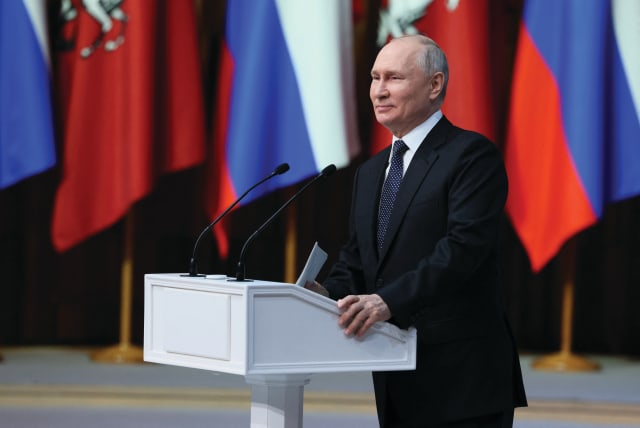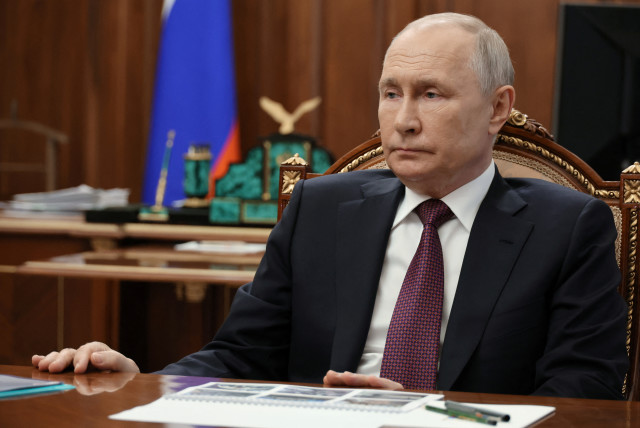Vladimir Putin is no competent ruler, he's just a KGB guard dog - opinion

Despite ruling Russia for nearly a quarter of a century, Putin has not learned a thing and has not transformed himself into a statesman. He remains the same KGB guard dog.
In the early 1960s, writer Georgy Vladimov wrote Faithful Ruslan, a novel about a German shepherd trained to guard prisoners at a labor camp during Stalinist terror. After Stalin died, the prisoners were released, the guards departed and Ruslan, along with other guard dogs, became a stray. They scavenge in the trash and reminisce about the good old days when they were fed, slept warm and had fun keeping prisoners in line.
One day a group of construction workers arrive at the remote village near Ruslan’s camp. As they walk on the road the dogs gather around them and try to herd them into a column – the way they used to do with prisoners. The workers resist, they pick up sticks and stones, and Ruslan is killed.
That was an allegory of Khrushchev’s “thaw,” when limited freedoms were allowed and society opened up, but when unreconstructed Stalinists were calling for the return of repressions. The novel has a happy ending, since the workers refuse to go back to the camps and hit back at the dogs.
But imagine if the dogs had won – what else would they have done once they marched the people back to the barracks? What kind of plan would they have concocted and how would they have implemented it?
Under Putin, Russia has gone to the dogs
Faithful Ruslan can be seen as an allegory of today’s Russia as well, since under Putin the dogs rule.
Security services were the guard dogs of communism. The notorious “Cheka,” the All-Russian Extraordinary Commission, was founded a mere six weeks after Lenin’s Bolsheviks took power. There was nothing extraordinary about “the organs” as the political police was called. In an alphabet soup of ever-changing acronyms – the GPU, the NKVD, the MVD and the KGB – the security apparatus always existed alongside the Communist Party.
It was a formidable machine of terror and repression, and Stalin was able to turn it into a personal weapon. He used it to eliminate his enemies and to impose terror on the rest of the country. Plenty of loyal communists, including Lenin’s comrades, were rounded up and shot. Security services eliminated the rich and the educated in the 1920s, ran the Great Purges of the 1930s and implemented the campaign against Jewish “rootless cosmopolites” in the late 1940s and the early 1950s.
Moreover, to ensure the loyalty of his closest associates Stalin often took their family members hostage.
The wife of Soviet president Mikhail Kalinin was sent to the camps, and the Jewish wife of foreign minister Vyacheslav Molotov was arrested for high treason in 1949, at the start of Stalin’s antisemitic campaign. The wife of Stalin’s private secretary Alexander Poskrebyshev – and mother of his two daughters – was arrested and executed.
After Stalin’s death, his successors decided to place the security apparatus safely under party control. The head of Stalin’s NKVD Lavrenty Beria was shot, the organization was renamed the KGB, and party hacks were installed as its chiefs. The functions of the KGB were limited to arresting dissidents, spying on citizens at home, and running covert operations abroad. It was faithfully doing the party’s bidding and, mindful of the terror of the past, the party kept it on a very short leash.
That was the KGB which young Vladimir Putin joined in the early 1970s.
AND THEN the Soviet Union collapsed. The end of communism was marked when a crowd removed the statue of Felix Dzerzhinsky, the founder of the Cheka, in front of the KGB headquarters on Lubyanka Square.
The party disappeared, the communist ideology was declared bankrupt, censorship was abolished and political prisoners were released. Tens of thousands of KGB operatives and secret agents found themselves without a master and out of work – just like Ruslan and other guard dogs in Vladimov’s novel. Some became flunkies of the rich oligarchs, others joined one of the many criminal gangs. Those who stayed in the service were demoralized: Every day the newly emboldened press kept exposing the vile crimes committed by the secret police during the Soviet era.
And then a miracle happened: President Boris Yeltsin appointed one of their number as his successor. Not the best or the brightest – in fact, a very mediocre lieutenant colonel consigned during the 1980s to Dresden, East Germany, a backwater where his job was to debrief prostitutes sleeping with West German visitors. But Putin was a faithful KGB foot soldier who promptly declared that there were no former KGB members.
It is as if Ruslan and his pack actually managed to subjugate the workers. KGB operatives were no longer a party tool reined in by party bosses but the masters of the universe. They had the country to themselves – to do as they pleased.
They started out by stealing – just as the stray dogs would have first eaten their fill.
The past two decades have been a veritable orgy of kleptocracy. Members of Putin’s close entourage, consisting of former KGB officers, have suddenly joined the Forbes list of billionaires with enormous assets and properties secreted abroad. Putin himself is reputed to be the wealthiest man alive, with hundreds of billions of dollars to his name.
All that was nice and good, but not enough. It was not what they had been trained for. Putin’s closest buddies Nikolai Patrushev, Igor Sechin, Sergey Chemizov, and others were high-ranking KGB officers during the Soviet time. Naturally, their instinct was to shape Russian society into a familiar column of labor camp prisoners.
Freedom of speech was curtailed and then eliminated, dissent was quashed, opposition politicians and journalists were either jailed or killed, elections became a predictable farce, the Duma, or parliament, was transformed into an assemblage of freaks and courts lost their independence and began to mete out lengthy sentences to those who dared to think differently.
This looks very much like Brezhnev’s era, but Putin wanted more: not just to revive the Soviet Union in Russia but to win back the physical territories of the Soviet Empire, starting with Ukraine. That of course was a major disaster and a massive failure that will likely crash his regime.
But that fatal error could have been predicted. Despite ruling Russia for nearly a quarter of a century, Putin has not learned a thing and has not transformed himself into a statesman. He remains the same guard dog from Faithful Ruslan he was trained to be by Yuri Andropov, the party boss who was the head of the KGB when Putin joined it. He and his cohorts can form Russia into a column of prisoners and guard them – but are not competent to do much else.
The writer, a New York-based economist, is a member of the US Andrei Sakharov Foundation. In 2005-2008, he organized a support group for the Hebrew Immigrant Aid Society, bringing together Soviet Jewish immigrants in the United States.
Jerusalem Post Store
`; document.getElementById("linkPremium").innerHTML = cont; var divWithLink = document.getElementById("premium-link"); if (divWithLink !== null && divWithLink !== 'undefined') { divWithLink.style.border = "solid 1px #cb0f3e"; divWithLink.style.textAlign = "center"; divWithLink.style.marginBottom = "15px"; divWithLink.style.marginTop = "15px"; divWithLink.style.width = "100%"; divWithLink.style.backgroundColor = "#122952"; divWithLink.style.color = "#ffffff"; divWithLink.style.lineHeight = "1.5"; } } (function (v, i) { });

